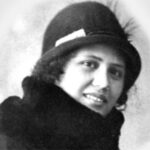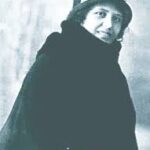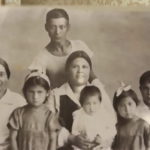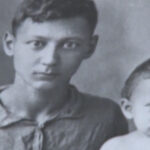Bilal Suleyev
Bilal Suleyev’s wife is Fatima Zeinullinovna Gabitova (1903–1968).
Fatima Gabitova is a legendary woman, born on October 14, 1903 in the city of Kapal (now Taldy-Kurgan region). Her mother, Gainizhamal Dzhilkibayeva, was an educated woman, a beautiful maid, and was highly respected by the people of the city. Father, Zainulla Gabitov, was engaged in trade, and he was lucky in business. When Fatima was sixty months old, Zainullah died suddenly, rumor has it that he had been poisoned. At the age of fourteen, Gainizhamal was left a widow with three minor daughters in her arms – Razia, Marzia and Fatima.
All three sisters received their primary education from their mother. At the age of eight, Fatima entered a Russian elementary school for girls, from which she graduated when she was eleven. In addition, on Sundays she attended a Tatar women’s school, and then continued her studies at the Yakobie madrasah, completing it in 1917.
After graduating from the madrasah in Kapala, Fatima passed the external exams for the curriculum of the Khusainia madrasah, located in present-day Chkalov. From 1918 to 1920, she taught at the Kapal Tatar School of the 1st stage and at school №3 of the former Taneken volost, and for the next two years she taught the Kazakh language and was in charge of the educational department at the Tatar secondary school in the city of Dzharkent.
In 1918, Fatima got married to Bilal Suleyev, who was fluent in Russian and Tatar along with Kazakh language. At that time, B. Suleyev was already an authoritative worker in education, headed the Committee of the Poor. From 1920 to 1929, heading the Semirechensk regional department of public education, Suleyev organized the opening of schools and boarding schools in all settlements of the region. In 1928, Bilal Suleyev, together with Uraz Dzhandosov, put a lot of effort into organizing and opening the first university in Kazakhstan. By that time, two children were born in the family of Bilal and Fatima: daughter Farida in 1919, and son Zhanibek in 1923. Fatima continued her work in the pedagogical field – in the Alma-Ata Kazakh school №8 named after A. Baitursynov and in the Regional Kazakh experimental nine-year school. In 1928, the Suleyev family moved to Aktyubinsk. In the winter of 1930, grief suddenly struck them – the ten-year-old daughter Farida died.
Soon Bilal was appointed rector of the Pedagogical Institute in Semipalatinsk. The family moved to a new place, where Fatima got a job as a teacher at a pharmaceutical college. In November 1930, the son Azat was born to the Suleyevs. In the same year, on a false denunciation, Bilal was taken into custody by the People’s Commissariat of Internal Affairs.
After his release in 1932, he left for Moscow, where he was engaged in cultural and educational activities at work. In 1934, B. Suleyev was sent to Nukus to work in the People’s Commissariat of Education of Karakalpakstan, and in 1937 he was re-arrested and shot.
After her husband’s departure for Moscow, Fatima returned from Semipalatinsk to Alma-Ata with two children. She worked as a teacher of the Kazakh language at a communist university, then as a researcher in the “Art, Science and Literature” sector at the People’s Commissariat of Education of Kazakhstan, where she was mainly responsible for supervising libraries. In 1934, F. Gabitova worked at the Regional Trade Union Bureau of Writers and Literary Workers under the Central Committee of the Communist Party (b) of Kazakhstan, edited folklore and children’s books at the Kazakh publishing house of fiction.
From 1932 to 1937, F. Gabitova got married to the poet Ilyas Dzhansugurov. Three children are born in the marriage – Umut (b. 1933), Ilfa (b. 1935) and Bulat (b. 1937). In August 1937, Dzhansugurov was arrested on slanderous charges and in February 1938 he was shot as a “Japanese spy”.
Fatima Gabitova is the wife and muse of three prominent Kazakhstani personalities (educator Bilal Suleyev, poet Ilyas Zhansugurov and writer Mukhtar Auezov).
Wherever Fatima worked, she enjoyed great prestige. She often made presentations at district conferences, was the chairman of the teachers’ union, was actively involved in social work, helped to supply teachers with food, clothing, educational and methodological literature. In 1946, she was awarded the 1st degree “Medal of Motherhood” and the medal “For Valiant Labor in the Great Patriotic War of 1941-1945.” With the help of Mukhtar Auezov, Fatima managed to obtain a residence permit in the capital, and in 1947 the family returned to Alma-Ata, where Fatima worked as a teacher at the male secondary school № 18 until her retirement.
In the early 1950s, having taken a well-deserved rest, Fatima began work on the Ilyas archive, which she managed to save from confiscation. She always believed in the triumph of justice, and the year 1957 justified her hopes: Ilyas Dzhansugurov was posthumously rehabilitated.
Fatima launched an active work on the publication of his works, edited, collected them, put in order the poet’s archive, wrote articles and memoirs about him, in a word, she lived for one thing – to revive the glory of Ilyas. In 1964, in the homeland of the poet, on the banks of the Aksu River, the 70th anniversary of Ilyas Dzhansugurov was solemnly celebrated, in the organization of which Fatima also actively participated.
That same year, she was diagnosed with esophageal cancer, which eventually led to her untimely death on January 6, 1968.
Daughter of Bilal Suleyev – Farida Bilyalovna Suleyeva (1919–1930)
Farida Bilyalovna Suleyeva was born in 1919, died suddenly at the age of 10 in the winter of 1930.
The son of Bilal Suleyev – Zhanibek Bilyalovich Suleyev (1923-1943)
Zhanibek Suleyev – the son was born on February 23, 1923 in the Alakol district of the Alma-Ata region. He was the eldest son of a bright representative of the intelligentsia and educator Bilal Suleyev. Bilal Suleyev and Fatima Gabitova had three children, but one child died. On a false denunciation, Bilal was imprisoned. The family broke up.
“My mother had seven children. We all grew up together, respected each other. Zhanibek was 12 years older than me. He was a very close brother. In 1940 we returned to Alma-Ata, Zhanibek often came then. I remember there were not enough chairs, when we were sitting at the table, he took the hood of the sewing machine and sat on it,” recalls Zhanibek Suleyev’s younger sister, Ilfa Zhansugurova-Zhandosova.
Everyone loved Zhanibek very much, he was a real fighter for truth and justice. He especially charmed children with his jokes and games.
“He bathed us in the Irtysh, took us for a walk. We had high hopes for him, but fate had its own way,” says Ilfa.
Suleyev went to war as a volunteer, he was drafted into the ranks of the army by the Sulikamsky district military commissariat of the Sverdlovsk region on December 1, 1942.
“Repression, injustice, he wanted to protest. He is young, physically prepared, goes to war as a volunteer. It turned out to be painful for the maternal heart of Fatima, who had previously lost Bilal, then Ilyas. Zhanibek is her first-born, he was especially dear to her. Therefore, when information about his whereabouts came, my mother always wanted to go there,” says Zhanibek Suleyev’s younger brother Murat Auezov.
According to Layla Akhmetova, Doctor of Historical Sciences, Professor of Al-Farabi Kazakh National University, the Red Army rifleman fought for only four months. But the 20-year-old soldier, who did not undergo special training, managed to distinguish himself with courage by destroying a German sniper. The guy took his rifle from the wounded Soviet sniper and shot the German sniper from the third shot. Thanks to this, his unit managed to take the height in the Smolensk region. For courage, he was presented with two medals. However, Suleyev did not manage to hold either the first or the second medal in his hands. In early April 1943, he was wounded, taken to the medical sanitary battalion, where he later died.
According to archival data, Zhanibek Suleyev was buried in the village of Shishi near Smolensk, which was renamed Zaozerye in 1963.
The son of Bilal Suleyev – Azat Bilyalovich Suleyev (1930 – 1997)
Azat Suleyev – the son of Bilyal Suleyev – was born in 1930. A Turkologist, a master of interlinear translation from Kazakh into Russian, gave Olzhas Suleimenov the idea of the book AZiYA.
Grandson of Bilal Suleyev – Zhanibek Azatovich Suleyev (born 1962)
Zhanibek Suleyev – the grandson of Bilal Suleyev, the son of the youngest son Azat – was born on December 1, 1962 in Alma-Ata.
In 1983 he graduated from the Alma-Ata film technical school, in 1991 – Kazakh State University named after S. M. Kirov, Kazakhstani journalist.
He worked as a methodologist at the Republican House of Cinema, served in the Internal Troops, worked as head of the Russian editorial office of the Arai-Zarya magazine, head of the information and political work center of the National Unity of Kazakhstan Union, correspondent for the Finance of Kazakhstan magazine, deputy editor-in-chief of the newspaper “Dauir-Vremya”, political observer of the newspaper “Birlik”, head of the department of the newspaper “New Generation”, political observer of the newspaper “Atamura – Capital Review”, chief specialist of the Almaty Regional Department of Information and Public Accord, deputy editor-in-chief of the newspaper “451º Fahrenheit” , columnist for the online newspaper “Navigator” and the newspaper “Megapolis”
From 2003 to 2004 – the first Deputy, acting Editor-in-Chief, editor-in-chief of the newspapers “Country and World” and “Dala Men Kala”.
From 2004 to the present, he has been the project coordinator (editor-in-chief) of Dialog.Kz and a number of Internet publications of a socio-political orientation.
In 2009–2010 he was Deputy General Director of Izvestia-Kazakhstan LLP.
In 2011 – editor-in-chief of the newspaper “MK in Kazakhstan”.
Member of the Union of Journalists of the USSR and the Union of Journalists of Kazakhstan.
Zhanibek Suleyev is married, has three children.
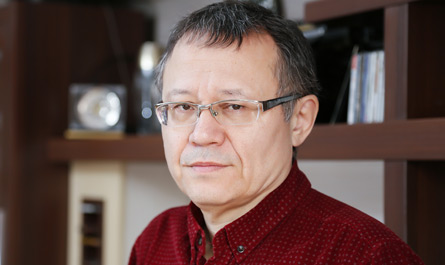
Bibliography
Fatima. Diaries, memoirs, poems, articles, interviews / Comp. M. Zhanuzakova. – Almaty, – “Zhibek Zholy”. – 2010. – P.416
